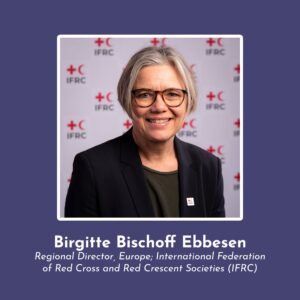
Show Summary
With the increase in geopolitical conflicts, supply chain challenges, and unprecedented natural disasters, there is more need than ever for international humanitarian organizations that transcend political and national allegiances. How will such organizations grow and evolve to become a central component to humanity’s adaptation to the coming Great Simplification?
In this episode, Nate is joined by European Regional Director for The Red Cross, Birgitte Bischoff, to discuss her vision for the future of humanitarian work and the challenges and opportunities for more proactive and prepared planning. Together, they discuss the critical importance of individual volunteers and the integration of a systems thinking approach at The Red Cross.
How will diplomacy and an emphasis on social responsibility help us navigate the growing international pressures from rising migration and resource constraints? In what ways can scenario planning improve our responses to the multitude of converging crises, as well as foster resilience? Most of all, in an unknown future of potentially existential challenges, what can we do to be prepared and respond with empathy and tolerance?
About Birgitte Bischoff
Birgitte Bischoff Ebbesen is the International Federation of the Red Cross Regional Director for Europe, covering 53 Red Cross Red Crescent National Societies in Europe and Central Asia. The Regional Director is responsible for implementing the IFRC mandated functions: Strategic and Operational Coordination; Membership Services and Humanitarian Diplomacy in the region.
Birgitte has more than 15 years’ experience working with the IFRC network and was previously the International Director of Danish Red Cross and Co-chair of the IFRC Reference Centre for Psychosocial Support.
In French, we have a motto that says that a simple drawing is often better than a long explanation. Jean-Marc Jancovici Carbone 4 President
That’s very understandable because with left atmosphere thinking, one of the problems is that you see everything as a series of problems that must have solutions. Iain McGilchrist Neuroscientist and Philosopher
We can’t have hundreds and hundreds of real relationships that are healthy because that requires time and effort and full attention and awareness of being in real relationship and conversation with the other human. Nate Hagens Director of ISEOF
This is the crux of the whole problem. Individual parts of nature are more valuable than the biocomplexity of nature. Thomas Crowther Founder Restor
Show Notes & Links to Learn More
Download transcript00:00 – Birgitte Bischoff Ebbesen info, International Committee of the Red Cross (ICRC)
03:10 – Danish Refugee Council
06:03 – Fundamental principles of the Red Cross
08:00 – Danish Red Cross
12:12 – Red Cross response to Covid-19
16:17 – International Federation for the Red Cross (IFRC)
27:10 – World migration report 2024 + the future of migration
27:57 – Over 6 million Ukrainian refugees spread across Europe
28:30 – Red Cross and the Syrian crisis
35:07 – 2004 Tsunami
39:20 – Cascade Institute + introduction to polycrisis analysis
41:38 – Strategic foresight at OECD + EU
50:51 – Red Cross response to Ukraine crisis
1:09:20 – Global inequality







